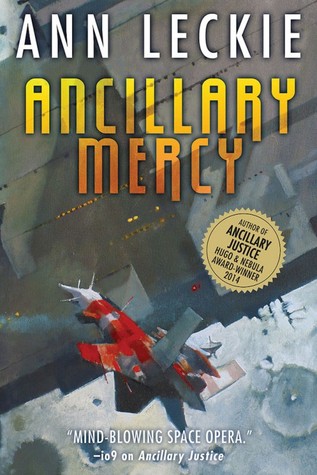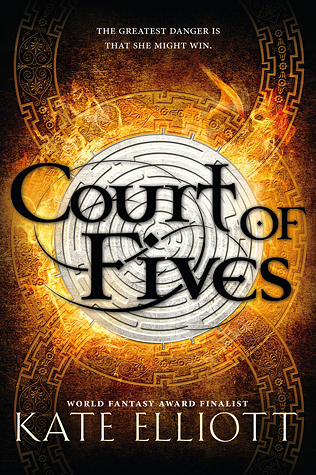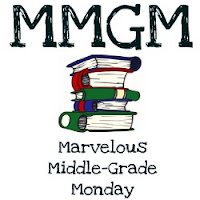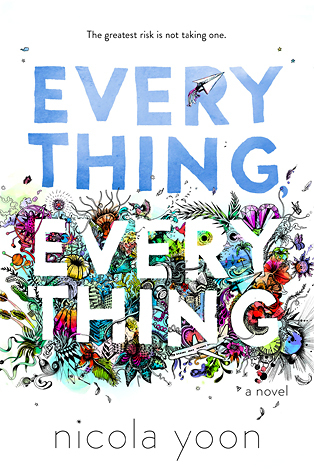Okay, everyone is doing this, I guess I can too; I've got one day left in 2015!
I'll keep it brief, with links to my reviews.
Favourite Adult Books:
Ancillary Justice, by Ann Leckie
The Goblin Emperor, by Katherine Addison
Uprooted, by Naomi Novik
The Shadow Throne, by Django Wexler
Everyone loved these, so I don't have to explain why I did too!
Favourite YA Books:
The Perilous Gard, by Elisabeth Pope. A book I should have discovered as a teen but missed somehow.
Black Dog and Pure Magic, by Rachel Neumeier. Original take on werewolves, great characters.
The Scorpion Rules, by Erin Bow. Lots of buzz about this one, all deserved.
Orleans, by Sherri L. Smith. Very original post-apocalyptic. Worth looking for.
The Rest of Us Just Live Here, by Patrick Ness. Awesome premise, and Jared. That's all I'm sayin'.
Everything, Everything, by Nicola Yoon. So sweet!
Favourite Middle-Grade Books:
The Jinx series, by Sage Blackwood. Fairy tales remixed into awesomeness.
The Lie Tree, by Francis Hardinge. Because it's by Francis Hardinge.
The 100 Cupboards series, by N.K. Wilson. A new favourite author. Narnia, updated.
Harriet the Invicible, by Ursula Vernon. She's a hamster princess, and she kicks butt.
The Penderwicks on Gardam Street, by Jeanne Birdsall. Wonderful, funny family dynamics.
Wednesday, December 30, 2015
Friday, December 18, 2015
What's on my Kindle for holiday reading
I've been saving a few sequels for the long plane trip I'm taking, so I'm excited about getting to the airport! Here's what my e-readers look like:
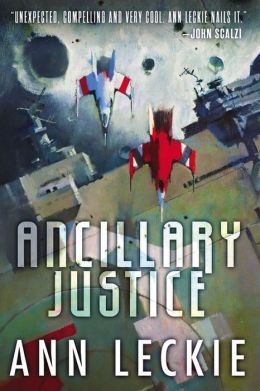
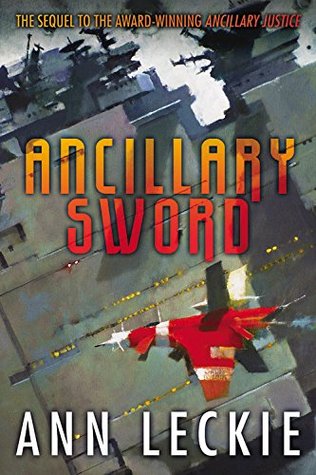
I'm going to re-read the first two before diving into Mercy. Can't wait to see how Leckie finishes this series!
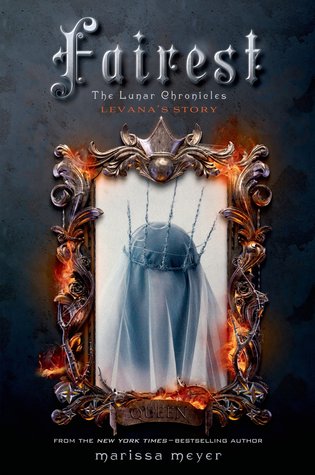 I want Winter in hardcover to go with all the other pretty books in the series, but I don't want to lug a hardcover to Germany and I want to read it! I just re-read Cress to get me up to speed, and I'm looking forward to having fun with the conclusion. (This is the final book, right?!) I also have the e-book of Fairest out from the library, so maybe I'll read it first.
I want Winter in hardcover to go with all the other pretty books in the series, but I don't want to lug a hardcover to Germany and I want to read it! I just re-read Cress to get me up to speed, and I'm looking forward to having fun with the conclusion. (This is the final book, right?!) I also have the e-book of Fairest out from the library, so maybe I'll read it first.
 I've also got the third Elemental Blessings novel; a world I always enjoy returning to.
I've also got the third Elemental Blessings novel; a world I always enjoy returning to.
And everyone's been saying such good things about Kate Elliot's YA novel that I decided to go ahead and buy it.


I'm going to re-read the first two before diving into Mercy. Can't wait to see how Leckie finishes this series!
 I want Winter in hardcover to go with all the other pretty books in the series, but I don't want to lug a hardcover to Germany and I want to read it! I just re-read Cress to get me up to speed, and I'm looking forward to having fun with the conclusion. (This is the final book, right?!) I also have the e-book of Fairest out from the library, so maybe I'll read it first.
I want Winter in hardcover to go with all the other pretty books in the series, but I don't want to lug a hardcover to Germany and I want to read it! I just re-read Cress to get me up to speed, and I'm looking forward to having fun with the conclusion. (This is the final book, right?!) I also have the e-book of Fairest out from the library, so maybe I'll read it first. I've also got the third Elemental Blessings novel; a world I always enjoy returning to.
I've also got the third Elemental Blessings novel; a world I always enjoy returning to.And everyone's been saying such good things about Kate Elliot's YA novel that I decided to go ahead and buy it.
Monday, December 14, 2015
MMGM: Book Scavenger and The Spotted Dog Last Seen
A couple of mystery/puzzle books for those who loved The Westing Game, The Mysterious Benedict Society and Blue Balliett's books.
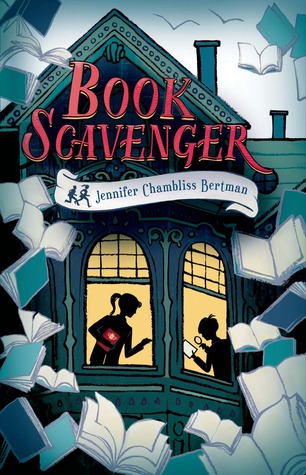 Book Scavenger, by Jennifer Chambliss Berman, has the best premise: a book-hunting game like geocaching except when you hide a book you create a puzzle someone has to solve in order to find it. I badly want this game to be real, and if you're in the States you can participate in Bertman's version of it. I think everyone should go join up right now, because this needs to become the next big thing!
Book Scavenger, by Jennifer Chambliss Berman, has the best premise: a book-hunting game like geocaching except when you hide a book you create a puzzle someone has to solve in order to find it. I badly want this game to be real, and if you're in the States you can participate in Bertman's version of it. I think everyone should go join up right now, because this needs to become the next big thing!
But the book. It's a fun scavenger hunt through San Francisco as Emily tries to solve the last game created by eccentric entrepreneur Garrison Griswold. She's chased by a couple of nasty henchmen, determined to get their hands on whatever the prize turns out to be, and she's aided by her new neighbour and equally keen puzzle-solver James.
As in all puzzle books, there were plot aspects that seemed contrived, but I enjoyed the trip through San Francisco's geography and literary history. There were fun juicy tidbits about Edgar Allen Poe and his friend/nemesis Griswold (a real historical character); Bertman has an afterword in which she explains what she took from history. (I didn't know that Poe invented the detective-mystery genre.)
Emily is an engaging protagonist, and I liked her developing friendship with James, complete with misunderstandings and Emily learning what friendship means. Emily's family plays a realistic role, with an older brother who used to play Book Scavenger with her but is now obsessed with a rock band, and her parents who make a living based on their goal to live in every one of the 50 States (the reason why Emily has moved nine times in her twelve years and therefore has such a hard time making friends).
Book Scavenger is nominated for a Cybil award in the Middle-Grade Fiction category. I think I'm glad I'm not judging that category, because it would be hard to judge between the more serious, issue-based, Newberry contender novels and more fun ones like this. (I myself prefer the fun ones!)
My son is making my microwave caramel recipe right now, and he's planning on pouring the caramel over Rice Krispies. That sounds like a good comparison for this book: chewy, sweet and crispy.
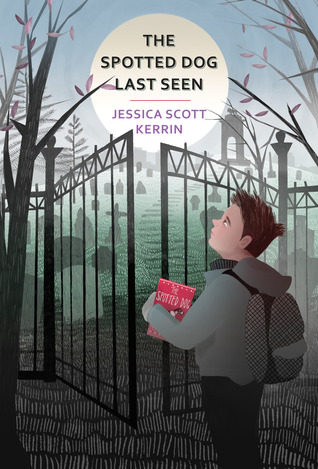 The Missing Dog is Spotted is another Middle-Grade Fiction nominee. I love the pun in the title! My library didn't have it, but I did find Jessica Scott Kerrin's earlier novel, The Spotted Dog Last Seen. The two books are connected but each stands alone.
The Missing Dog is Spotted is another Middle-Grade Fiction nominee. I love the pun in the title! My library didn't have it, but I did find Jessica Scott Kerrin's earlier novel, The Spotted Dog Last Seen. The two books are connected but each stands alone.
Dog Last Seen is a quirky mystery about death, gravestones, accidents and responsibility. Derek gets stuck with cemetery duty for his community service. Who knew there was so much to know about gravestones? Then there's a library book with a secret code pencilled inside it that Derek and his fellow cemetery duty friends are determined to solve. The librarian knows more about it than she's saying. But the real mystery is the nightmares Derek keeps having about a car accident.
Everything turns out to be connected, and Derek is able to lay a ghost of his own to rest by the time all the mysteries are solved. I think one of the satisfactions of fiction—and of puzzles—is discovering that everything fits together. Nothing is random. Dog Last Seen plays with connection and coincidence to get at the deeper theme that everyone is significant. Although on the surface this book seems quite similar to Book Scavenger, there is more going on here; like its title, The Spotted Dog Last Seen yields more meaning the more you think about it.
I am eager to get my hands on The Missing Dog is Spotted and find out what new interesting characters and mysteries Kerrin has in store. If it's anything like Spotted Dog, I think it should be a strong contender for the Cybil award. (And I'm not just saying that because Jessica Scott Kerrin is a Canadian author!)
I am now completely stuffed with caramels (they turned out delicious, but slightly overcooked so impossible to get out of the pan!), so I can't think of any other food analogies. Something savoury, though, with enjoyable flavours in unique combinations.
Don't forget to visit Shannon Messenger's weekly round-up of Marvelous Middle-Grade books. And for more Canadian books to try, go to John Mutford's truly northern blog.
 Book Scavenger, by Jennifer Chambliss Berman, has the best premise: a book-hunting game like geocaching except when you hide a book you create a puzzle someone has to solve in order to find it. I badly want this game to be real, and if you're in the States you can participate in Bertman's version of it. I think everyone should go join up right now, because this needs to become the next big thing!
Book Scavenger, by Jennifer Chambliss Berman, has the best premise: a book-hunting game like geocaching except when you hide a book you create a puzzle someone has to solve in order to find it. I badly want this game to be real, and if you're in the States you can participate in Bertman's version of it. I think everyone should go join up right now, because this needs to become the next big thing!But the book. It's a fun scavenger hunt through San Francisco as Emily tries to solve the last game created by eccentric entrepreneur Garrison Griswold. She's chased by a couple of nasty henchmen, determined to get their hands on whatever the prize turns out to be, and she's aided by her new neighbour and equally keen puzzle-solver James.
As in all puzzle books, there were plot aspects that seemed contrived, but I enjoyed the trip through San Francisco's geography and literary history. There were fun juicy tidbits about Edgar Allen Poe and his friend/nemesis Griswold (a real historical character); Bertman has an afterword in which she explains what she took from history. (I didn't know that Poe invented the detective-mystery genre.)
Emily is an engaging protagonist, and I liked her developing friendship with James, complete with misunderstandings and Emily learning what friendship means. Emily's family plays a realistic role, with an older brother who used to play Book Scavenger with her but is now obsessed with a rock band, and her parents who make a living based on their goal to live in every one of the 50 States (the reason why Emily has moved nine times in her twelve years and therefore has such a hard time making friends).
Book Scavenger is nominated for a Cybil award in the Middle-Grade Fiction category. I think I'm glad I'm not judging that category, because it would be hard to judge between the more serious, issue-based, Newberry contender novels and more fun ones like this. (I myself prefer the fun ones!)
My son is making my microwave caramel recipe right now, and he's planning on pouring the caramel over Rice Krispies. That sounds like a good comparison for this book: chewy, sweet and crispy.
 The Missing Dog is Spotted is another Middle-Grade Fiction nominee. I love the pun in the title! My library didn't have it, but I did find Jessica Scott Kerrin's earlier novel, The Spotted Dog Last Seen. The two books are connected but each stands alone.
The Missing Dog is Spotted is another Middle-Grade Fiction nominee. I love the pun in the title! My library didn't have it, but I did find Jessica Scott Kerrin's earlier novel, The Spotted Dog Last Seen. The two books are connected but each stands alone.Dog Last Seen is a quirky mystery about death, gravestones, accidents and responsibility. Derek gets stuck with cemetery duty for his community service. Who knew there was so much to know about gravestones? Then there's a library book with a secret code pencilled inside it that Derek and his fellow cemetery duty friends are determined to solve. The librarian knows more about it than she's saying. But the real mystery is the nightmares Derek keeps having about a car accident.
Everything turns out to be connected, and Derek is able to lay a ghost of his own to rest by the time all the mysteries are solved. I think one of the satisfactions of fiction—and of puzzles—is discovering that everything fits together. Nothing is random. Dog Last Seen plays with connection and coincidence to get at the deeper theme that everyone is significant. Although on the surface this book seems quite similar to Book Scavenger, there is more going on here; like its title, The Spotted Dog Last Seen yields more meaning the more you think about it.
I am eager to get my hands on The Missing Dog is Spotted and find out what new interesting characters and mysteries Kerrin has in store. If it's anything like Spotted Dog, I think it should be a strong contender for the Cybil award. (And I'm not just saying that because Jessica Scott Kerrin is a Canadian author!)
I am now completely stuffed with caramels (they turned out delicious, but slightly overcooked so impossible to get out of the pan!), so I can't think of any other food analogies. Something savoury, though, with enjoyable flavours in unique combinations.
Don't forget to visit Shannon Messenger's weekly round-up of Marvelous Middle-Grade books. And for more Canadian books to try, go to John Mutford's truly northern blog.
Friday, December 11, 2015
The possessive pronoun ITS does not have an apostrophe in it. Not anywhere. Not ever.
Excuse me while I use the tiny platform that is my blog to attempt to correct the most egregious* and annoying error on the internet that is becoming almost universal and THERE IS NO REASON FOR IT because IT'S VERY SIMPLE FOLKS:
I have a book. My book is on the table. You wouldn't write my' book or m'y book or 'my book. That would be silly, right? You don't need an apostrophe because my is a possessive pronoun.
John has a book. John's book is on the table. You need an apostrophe because John is a noun and nouns become possessive with 's.
His book is about mutant zombie unicorns. You wouldn't write hi's book or his' book or h'is book. That would be silly. He's book would be silly, too. Pronouns don't become possessive with 's. His is the possessive pronoun. It doesn't need an apostrophe.
The Mutant Zombie Unicorn Association published a book. The Association's book explains why mutant zombie unicorns are misunderstood and should be accorded the same rights as any other unicorn. Association is a noun, and it becomes possessive with 's.
Its book is full of lies, damned lies and statistics and not a word of it should be believed. You wouldn't write its' book or it's book or i'ts book, because that would be just as silly as writing his' book or he's book. Its is a possessive pronoun. It doesn't need an apostrophe.
It's appalling how willing people are to believe that mutant zombie unicorns are innocent and harmless. It's always means it is. Always. Everytime you put an apostrophe in it's, you must say in your head "it is" and if that doesn't make sense then take the apostrophe out!
Are we clear now?
Okay, rant over. We now return you to your regularly scheduled blog.
*I spelled this wrong, and wouldn't have even known it if the red squiggly line hadn't told me.
I have a book. My book is on the table. You wouldn't write my' book or m'y book or 'my book. That would be silly, right? You don't need an apostrophe because my is a possessive pronoun.
John has a book. John's book is on the table. You need an apostrophe because John is a noun and nouns become possessive with 's.
His book is about mutant zombie unicorns. You wouldn't write hi's book or his' book or h'is book. That would be silly. He's book would be silly, too. Pronouns don't become possessive with 's. His is the possessive pronoun. It doesn't need an apostrophe.
The Mutant Zombie Unicorn Association published a book. The Association's book explains why mutant zombie unicorns are misunderstood and should be accorded the same rights as any other unicorn. Association is a noun, and it becomes possessive with 's.
Its book is full of lies, damned lies and statistics and not a word of it should be believed. You wouldn't write its' book or it's book or i'ts book, because that would be just as silly as writing his' book or he's book. Its is a possessive pronoun. It doesn't need an apostrophe.
It's appalling how willing people are to believe that mutant zombie unicorns are innocent and harmless. It's always means it is. Always. Everytime you put an apostrophe in it's, you must say in your head "it is" and if that doesn't make sense then take the apostrophe out!
Are we clear now?
Okay, rant over. We now return you to your regularly scheduled blog.
*I spelled this wrong, and wouldn't have even known it if the red squiggly line hadn't told me.
Wednesday, December 9, 2015
New Laini Taylor book coming!
This is officially my new most anticipated book of 2016:
Strange the Dreamer
Here's how Laini describes the main character:
Strange the Dreamer
(I'm assuming a cover is forthcoming. Though this kind of works for me!)
Here's how Laini describes the main character:
His name is Lazlo Strange, and he’s a junior librarian at the world’s greatest library. One of the first things that made me fall in love with him was when it came out that his nose had been broken by a falling volume of fairy tales. It was this tiny thing that came from of my fingertips one day (sometimes the words seem just to appear in the space between your fingertips and the keyboard), and suddenly…I had him: “Strange the Dreamer,” so-called by his colleagues, and not always kindly.Apparently the book is about
- the aftermath of a war between gods and men.
- a mysterious city stripped of its name.
- a mythic hero with blood on his hands.
- a young librarian with a singular dream.
- a girl every bit as perilous as she is imperiled.
- alchemy and blood candy, nightmares and godspawn, moths and monsters, friendship and treachery, love and carnage.
Monday, December 7, 2015
Everything, Everything, by Nicola Yoon
This book. This book, people.
This book is perfect.
This book has everything (ha, ha, get it?). All the feels. Stunning command of language. Brilliant use of structure. Living, breathing, flesh-and-blood characters. Deep, honest themes. Really cute kids who fall in love. (That's in the blurb, so it doesn't count as a spoiler.)
And that cover! I keep touching it to see if it's real. Plus there are awesome illustrations and graphic designs inside the book that add a wonderful immediacy to Madeleine's narration.
I want to quote the whole thing, but it's hard to find any quotes that aren't spoilery. Here's a good one:
Then Ollie and his family move in next door, and Ollie dresses in black and is athletic and sardonic and does hilarious things with a bundt cake. Madeleine is terrified of getting to know him because it can only end sadly. They can't even meet! But how can she resist?
There is so much going on in this book, and I can't tell you about any of it! Just know that it's utterly compelling (I sat in a chair, opened it up, and didn't get up from the chair until I was finished). It's also very funny. Olly and Madeleine have intelligent witty banter that actually sounds realistic. Their developing relationship is delightfully, exquisitely drawn.
And the ending is the best kind of ending: the one you never saw coming, but when it happens you realize you should have known all along.
YA romance isn't really my genre, but when it's done like this one I can't help but like it.
My mom's melt-in-your mouth shortbread (which I'm about to make, because Christmas baking!).
This book is perfect.
This book has everything (ha, ha, get it?). All the feels. Stunning command of language. Brilliant use of structure. Living, breathing, flesh-and-blood characters. Deep, honest themes. Really cute kids who fall in love. (That's in the blurb, so it doesn't count as a spoiler.)
And that cover! I keep touching it to see if it's real. Plus there are awesome illustrations and graphic designs inside the book that add a wonderful immediacy to Madeleine's narration.
I want to quote the whole thing, but it's hard to find any quotes that aren't spoilery. Here's a good one:
"Love can't kill me," I say.
"That's not true," she says. "Whoever told you that?"I adored Madeleine from the moment I met her, with her colourful books in her white room with the white walls and white bookshelves, and her heartbreaking "Reward if Found" ideas that she writes in each book. Trapped in her house by a rare disease, she is patient and funny and self-aware and so, so sad.
Then Ollie and his family move in next door, and Ollie dresses in black and is athletic and sardonic and does hilarious things with a bundt cake. Madeleine is terrified of getting to know him because it can only end sadly. They can't even meet! But how can she resist?
It's almost certainly going to be a disaster.
There is so much going on in this book, and I can't tell you about any of it! Just know that it's utterly compelling (I sat in a chair, opened it up, and didn't get up from the chair until I was finished). It's also very funny. Olly and Madeleine have intelligent witty banter that actually sounds realistic. Their developing relationship is delightfully, exquisitely drawn.
And the ending is the best kind of ending: the one you never saw coming, but when it happens you realize you should have known all along.
YA romance isn't really my genre, but when it's done like this one I can't help but like it.
My mom's melt-in-your mouth shortbread (which I'm about to make, because Christmas baking!).
Tuesday, December 1, 2015
Orleans, by Sherri L. Smith
Taking a break from Cybils nominees today: I was browsing in the library and I happened to see this cover and I had to bring this book home. And wow. This is quite the book.
Orleans came out a couple of years ago, and I'm surprised it didn't get more notice, either in the blogosphere or on the awards circuit. This is a significant book. It's also not a very typical YA novel; in particular it's not a typical YA dystopian, and that's part of why I loved it (and maybe why some readers were left a little stranded by it).
The cover is perfect. I can't stop looking at it, it's so beautiful. Plus, it perfectly represents the vivid, gorgeous, fascinating, terrifying—and terrifyingly plausible—world Smith has created. Orleans is what New Orleans becomes after multiple hurricanes have devastated it, after a terrible plague sweeps through it and after the rest of the States wall it off to prevent the plague from spreading. Those who didn't die of Delta Fever band together in tribes based on blood type as a way to prevent the worst effects of the disease. Cut off from the rest of the world except for whatever smugglers can bring in, a strange, dangerous society evolves.
I can't say enough about the world-building in Orleans. Unlike almost all YA dystopias, this one has an entirely believable premise—the only thing that seemed a little contrived was the fever affecting different blood-types differently, and I don't know enough biochemistry to know how plausible that is. And, given the premise, this is how people would actually behave. I love that there are selfish, manipulative evil people making the most of the lawlessness and chaos, but there are also good people trying to take care of others, and there are regular folk just trying to survive. There's an economy that works; there's no central authority, but there are rules everyone obeys because it's to everyone's benefit to obey them.
Orleans reminded me of Olivia Butler's Parable of the Sower with its incisively accurate portrayal of humanity reacting to crisis. Both at the societal level and the individual, I was completely convinced by Smith's version of post-apocalyptic New Orleans.
And the environment: decaying, toxic, flooded, lush with swampy jungle. Never mind my description, just gaze at that cover and know that the narrative draws you right into that world.
But, however immersive the setting, if I don't like the protagonist I won't be able to read the book. I loved Fen de la Guerre. Fierce, intelligent, loyal, pragmatic, deeply scarred—physically and emotionally—by terrible things that have happened to her, she pursues her goal come hell or high water (quite literally) using whatever means she must. And her goal? I have not seen this yet in YA sci fi: she has to smuggle a newborn baby (not her own) across the wall to safety before the baby gets infected with the fever. Utterly compelling.
Fen's voice . . . let me give you a sample:
I could go on and on about this book, but I'll finish by telling you two things that this YA dystopian does not have:
Orleans came out a couple of years ago, and I'm surprised it didn't get more notice, either in the blogosphere or on the awards circuit. This is a significant book. It's also not a very typical YA novel; in particular it's not a typical YA dystopian, and that's part of why I loved it (and maybe why some readers were left a little stranded by it).
The cover is perfect. I can't stop looking at it, it's so beautiful. Plus, it perfectly represents the vivid, gorgeous, fascinating, terrifying—and terrifyingly plausible—world Smith has created. Orleans is what New Orleans becomes after multiple hurricanes have devastated it, after a terrible plague sweeps through it and after the rest of the States wall it off to prevent the plague from spreading. Those who didn't die of Delta Fever band together in tribes based on blood type as a way to prevent the worst effects of the disease. Cut off from the rest of the world except for whatever smugglers can bring in, a strange, dangerous society evolves.
I can't say enough about the world-building in Orleans. Unlike almost all YA dystopias, this one has an entirely believable premise—the only thing that seemed a little contrived was the fever affecting different blood-types differently, and I don't know enough biochemistry to know how plausible that is. And, given the premise, this is how people would actually behave. I love that there are selfish, manipulative evil people making the most of the lawlessness and chaos, but there are also good people trying to take care of others, and there are regular folk just trying to survive. There's an economy that works; there's no central authority, but there are rules everyone obeys because it's to everyone's benefit to obey them.
Orleans reminded me of Olivia Butler's Parable of the Sower with its incisively accurate portrayal of humanity reacting to crisis. Both at the societal level and the individual, I was completely convinced by Smith's version of post-apocalyptic New Orleans.
And the environment: decaying, toxic, flooded, lush with swampy jungle. Never mind my description, just gaze at that cover and know that the narrative draws you right into that world.
But, however immersive the setting, if I don't like the protagonist I won't be able to read the book. I loved Fen de la Guerre. Fierce, intelligent, loyal, pragmatic, deeply scarred—physically and emotionally—by terrible things that have happened to her, she pursues her goal come hell or high water (quite literally) using whatever means she must. And her goal? I have not seen this yet in YA sci fi: she has to smuggle a newborn baby (not her own) across the wall to safety before the baby gets infected with the fever. Utterly compelling.
Fen's voice . . . let me give you a sample:
The second rule of escape: Assess your assets.
I got two legs and two arms that work, so that be something. They took the chains off when they threw us in here. I got a half-empty bottle of baby formula. I got a shirt tied into a sling, and a baby. I got some hay, and that about it. Not a lot to go on.
Then a cough come from the other side of the room and I remember I got one other thing. I got the leper.The rhythm of the dialect worked for me; I could hear Fen in my head and it brought her to life. It's also another example of Smith's detailed realism, because there are actually several dialects and languages in the book, and Fen speaks more than one, depending on the circumstances.
I could go on and on about this book, but I'll finish by telling you two things that this YA dystopian does not have:
1. a teenager with special powers who saves the world
2. romanceSo you've been warned! Unless you think those are two essential elements, you need to go find this book. It's that good.
Subscribe to:
Posts (Atom)
